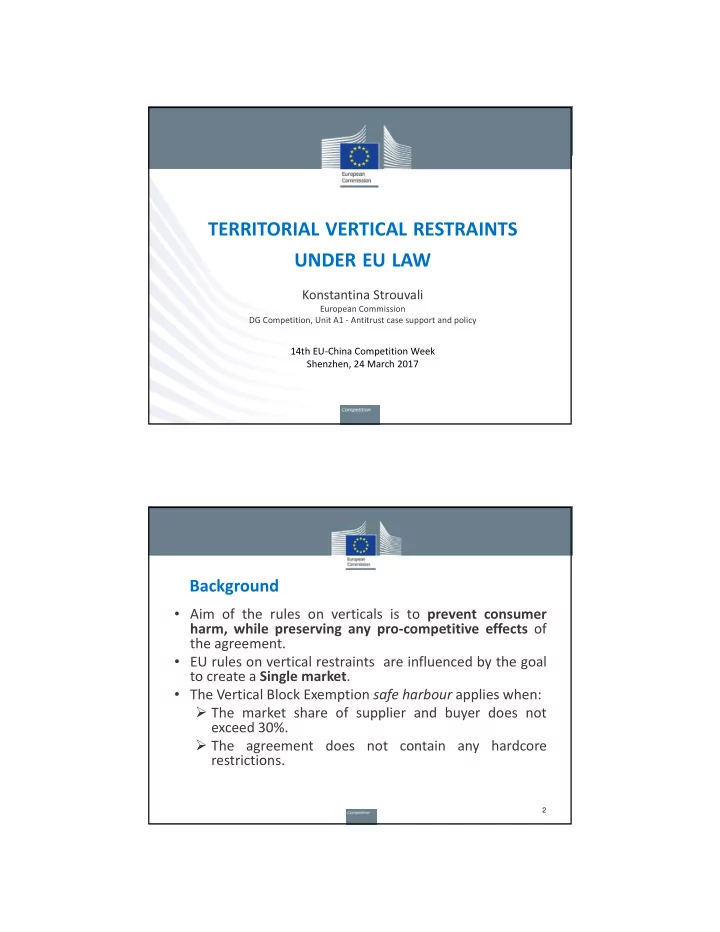

TERRITORIAL VERTICAL RESTRAINTS UNDER EU LAW Konstantina Strouvali European Commission DG Competition, Unit A1 ‐ Antitrust case support and policy 14th EU ‐ China Competition Week Shenzhen, 24 March 2017 Background • Aim of the rules on verticals is to prevent consumer harm, while preserving any pro ‐ competitive effects of the agreement. • EU rules on vertical restraints are influenced by the goal to create a Single market . • The Vertical Block Exemption safe harbour applies when: The market share of supplier and buyer does not exceed 30%. The agreement does not contain any hardcore restrictions. 2
Territorial/customer restrictions: principles • Territorial restraints in vertical agreements, save for certain exceptions, are considered hardcore restrictions and cannot benefit from the safe harbour of the Vertical Block Exemption: the concern is market partitioning and price discrimination . • The buyer/distributor should be free to (re)sell where and to whom it wishes . As a general rule: Active sales restrictions are hardcore restrictions. Passive sales restrictions are harcore restrictions. 3 Territorial/customer restrictions: types • Direct obligations , for example: Obligation not to sell or supply certain customers/territories. Obligation to refer orders from those customers to other distributors. • Indirect measures aimed at inducing compliance, for example: Refusal or reduction of bonuses/discounts. (Threat of) termination of supply. Requiring a higher price for exported products. 4
Territorial/customer restrictions: exceptions There are exceptions , where sales restrictions may benefit from the Vertical Block Exemption: • Restriction of active sales in exclusive distribution. • Restriction of selling to unauthorised distributors in the context of selective distribution. • Restricting wholesalers from selling to end users. • Restricting the resale of components to competitors of the supplier. • Restriction on the buyer’s place of establishment. Moreover, hardcore sales restrictions might be objectively necessary in exceptional cases. 5 Active/passive sales • Distinction particularly relevant for exclusive distribution. Absolute territorial protection will in most cases constitute an infringement ( Consten and Grundig ). • Actively approaching customers Active sales (e.g. direct marketing, targeted ads/promotions). • Responding to unsolicitated Passive sales requests from individual customers (including delivering) 6
Online sales restrictions (1) • Online sales are considered passive sales (the customer takes the initiative to visit the distributor’s website). • A ban on internet selling " has as its object the restriction of passive sales to end users wishing to purchase online and located outside the physical trading area " of the distributor. ( Pierre Fabre ) • The aim of maintaining a prestigious product image is not a legitimate purpose and cannot serve as an objective justification (but 101(3) individual exemption not excluded). 7 Online sales restrictions (2) • Certain indirect online sales restrictions will also be considered as hardcore, such as: Requiring website re ‐ routing of customers or termination of consumers' internet transactions where their credit card data or IP address reveal an address outside an allocated territory (" geo ‐ blocking "). Limiting the proportion of permitted online sales. Requiring to pay a higher price for products intended to be resold online, than for products intended to be sold offline ( dual pricing ). 8
Online sales restrictions (3) • However, not all limitations concerning online sales amount to hardcore restrictions. Question is: does the restriction limit the ability to use the internet as a distribution means? • A supplier is for example: Not required to accept Internet ‐ only distributors into its sales network ( brick and mortar requirement is OK ). Permitted to impose a minimum amount of sales offline . Permitted to require quality standards for advertising and sales online (relevant for selective distribution). 9
Recommend
More recommend